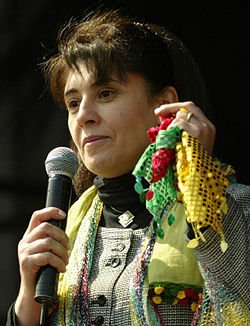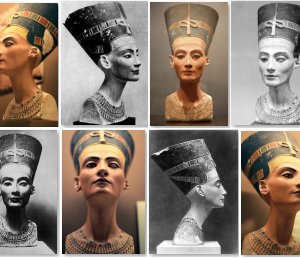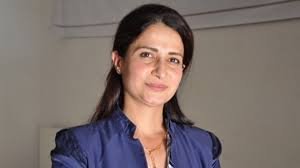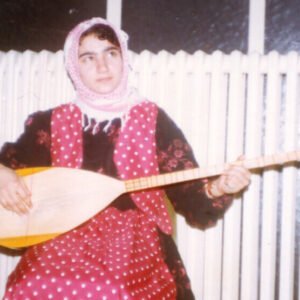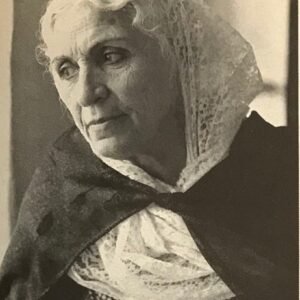Leyla Zana was born on May 3, 1961, to a Kurdish family in Silvan, Diyarbakır Province, in southeastern Turkey. At the age of 14, she married her cousin Mehdi Zana, who three years later, in 1977, became mayor of Diyarbakır, was imprisoned until the military coup and subsequently as a political prisoner.
After the arrest of her husband, Mehdi Zana, she and other relatives of prisoners tried to draw attention to the situation of prisoners. Mehdi Zana was prosecuted for publishing Kurdish poems. In 1987, Leyla Zana was first arrested for two months for participating in a rally against torture. In 1991, Leyla Zana was elected to the Grand National Assembly of Turkey for the Social Democratic People’s Party (SHP). She caused a scandal when she spoke Kurdish after taking her oath of office in parliament, even though the Kurdish language had been banned in Turkey for years. It wasn’t finally legalized until 1991, although speaking Kurdish in public remained prohibited when Zana took her oath of office.
She spoke only the last sentence of her oath in Kurdish: “I swear this oath for the brotherhood between the Turkish and Kurdish people.” This prompted calls for her arrest in the Turkish parliament, accusing her of being a “separatist” and “terrorist.”
Although Leyla Zana’s parliamentary immunity protected her, this party was banned after she joined, and her immunity was revoked. In December 1994, she was arrested along with four other Democratic Party MPs (Hatip Dicle, Selim Sadak, and Orhan Dogan) and charged with treason, membership in the armed Kurdistan Workers’ Party (PKK), and wearing the colors red, green, and yellow. Leyla Zana and the other detainees were sentenced to 15 years in prison. At her sentencing, she said: “This is a conspiracy. What I am defending is perfectly clear. I do not accept any of these accusations. And if they were true, I would take responsibility for them, even if it cost me my life. I have defended democracy, human rights, and brotherhood between peoples. And I will do so for the rest of my life.” In 1998, her prison sentence was extended due to a letter she had written, published in a Kurdish newspaper, which allegedly expressed banned pro-separatist views. While in prison, she published a book titled “Writings from Prison.”
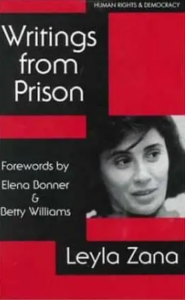
In 2001, the European Court of Human Rights ruled against Turkey following a review of her trial. Although Turkey did not recognize the outcome, a new harmonisation law of 2003 allowed for the reopening of cases based on ECHR rulings. In April 2004, their convictions and sentences were upheld in a trial. On June 9, 2004, the Supreme Court of Appeal ordered the release of Leyla Zana and the other defendants after a prosecutor requested the annulment of the previous verdict on technical grounds. Shortly thereafter, Zana and others founded a new political formation, the Democratic Society Movement (DTH). On August 17, 2005, the Democratic Society Party (DTP) was established as a merger of the Democratic People’s Party (DEHAP) and the DTH.
In December 2008, Leyla Zana was sentenced to another ten years in prison by a Turkish court. The court ruled that she had violated Turkey’s anti-terrorism law in nine different speeches. The European Union-Turkey Citizens’ Commission called on the European Union and the international community to act politically and condemn Turkey in the strongest possible terms for sentencing Leyla Zana to ten years in prison. Leyla Zana issued the following statement to the EUTCC: The trial against me is a violation of freedom of expression and poses a threat to every Kurd in Turkey. The court’s decision is just another way to suppress, silence, and punish the Kurds. The mentality in this country is that problems can be solved through anti-democratic and repressive means and that an unfair trial can bring political and social peace. Despite all this, our people will demand their legitimate rights and fight for them as long as necessary. On July 28, 2009, a court in Diyarbakır sentenced Leyla Zana to 15 months in prison. The reason for this was a speech she gave at the School of Oriental and African Studies (SOAS) at the University of London, where she had spoken out against Abdullah Öcalan. These prison sentences were overturned by higher courts. In December 2009, the Constitutional Court banned the DTP for alleged links to the PKK. Leyla Zana, Ahmet Türk, Aysel Tuğluk, Nurettin Demirtaş, Selim Sadak, and 30 other Kurdish politicians received a five-year political ban. While this decision prohibits them from membership in political parties, it does not prevent them from being elected to parliament as independent representatives.
She was re-elected to parliament on June 12, 2011. On July 1, 2012, Prime Minister Recep Tayyip Erdoğan met with Leyla Zana in his office. This meeting took place after a recent Hürriyet interview in which Leyla Zana expressed her hope that Prime Minister Recep Tayyip Erdoğan would resolve the Kurdish-Turkish conflict. Following her election in November 2015, she again used Kurdish words, using “people of Turkey” instead of “Turkish people,” which led to the Speaker of Parliament annulling her oath of office and her seat in parliament. In November 2016, Leyla Zana was briefly detained along with other BDP/HDP MPs and again accused of PKK ties. In February 2017, she was briefly detained again and interrogated as part of an investigation into alleged terrorism charges. In July 2017, Leyla Zana’s HDP parliamentary seat was subject to parliamentary scrutiny by the AKP, and her possible expulsion was threatened for “failure to take her oath of office and frequent absences.” On January 11, 2018, Zana’s parliamentary membership was revoked by a vote of 302 to 22 in the Turkish Parliament for failing to attend 212 parliamentary sessions from October 2016 to April 2017, with the CHP and HDP MPs present voting against. On March 17, 2021, Bekir Şahin, the prosecutor at the Court of Cassation, filed a lawsuit with the Constitutional Court demanding a five-year ban on political participation for her and 686 other HDP politicians, as well as the closure of the HDP due to their alleged organizational ties to the PKK.

